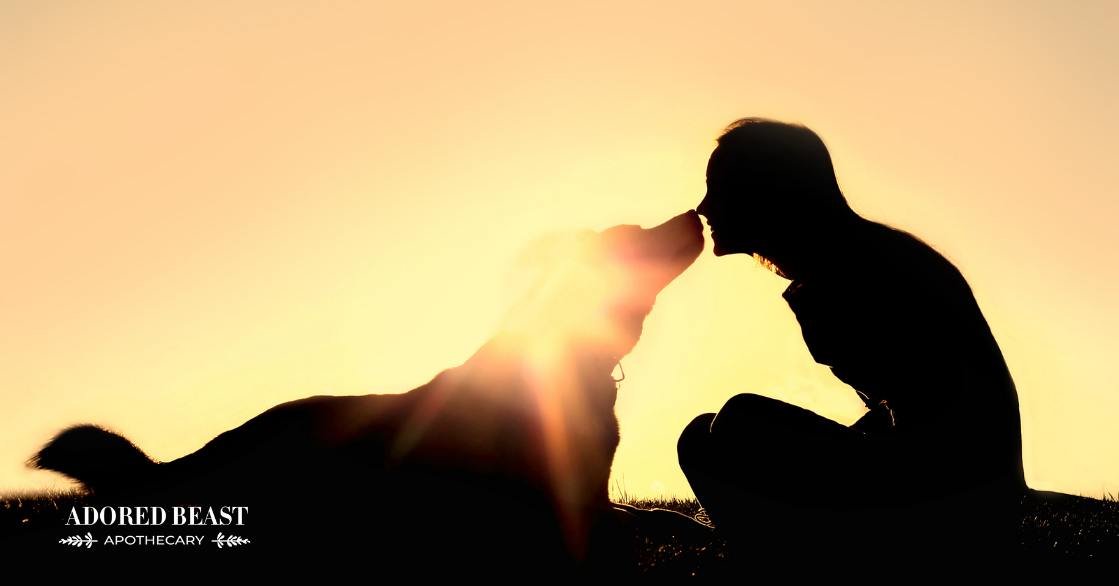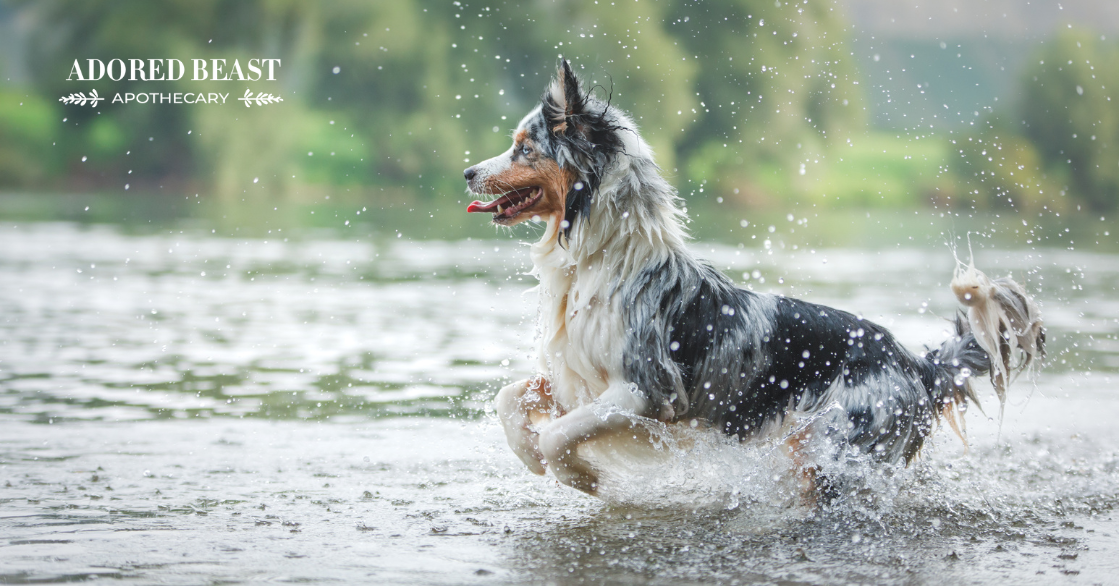Let’s face it, no one really likes to deal with dog poop (well, maybe no one except me – I study it, lecture about it, man I even have a species-specific probiotic made from it!!!). But dog poop just comes with being a dog parent. We keep an eye on it for its colour and consistency… and really, that’s about it. We then tend not to worry about it.
But my amazing team brought something to me that they read this week that blew their minds, and NOT in a good way:
“STUDY: Letting Your Dog Lick Your Face Could Kill You”
Oh my god, are your flipping kidding me! Talk about a fear-inducing headline, right?
And the study? It talked about dog poop!! Bacteria in dog poop specifically.
As you can imagine, this is super concerning to us – not because of the headline, but because we worry about the repercussions.
So, today we’re looking at the study, the realities of bacteria in dog poop (and human poop), and discussing what level of concern is really necessary.
Bacteria in Dog Poop: The Study
Let’s start with the study.
It was done by researchers at the UK Royal Veterinary College and the University of Lisbon by testing the feces of humans and animals in both the UK and Portugal.
The study included a total of 114 humans, 85 dogs, and 18 cats. All participants were healthy and had not been treated for any illness (including bacterial infection) for a minimum of 3 months previous.
Samples were collected and then genetically tested for antibiotic resistant bacteria – AKA superbugs.
Antibiotic resistant E.coli was found in the feces of:
- 16% of dogs (14 of 85)
- 5% of cats (1 of 18)
- 13% of humans (15 of 114)
Now, the researchers make it clear: most dogs (and people) have E.coli in their poop – that’s normal!!
But their study looked specifically at antibiotic resistant bacteria. And we’ll readily admit that that is a big deal. It is caused by pathogens evolving to evade drugs. These strains are known to be resistant to multiple antibiotics, such as penicillin and cephalosporins. And scientists are struggling with it year after year. It’s particularly harmful for those with compromised health.
Additionally, in 4 cases, people and their pets were found to have bacteria with matching antibiotic-resistant genes, suggesting that one had contaminated the other. (NOTE: the study was only observational, so it cannot prove pets were directly responsible for spreading the bacteria or genes to their owners).
From the lead author of the study, Dr. Juliana Menezes, an expert in veterinary science: “Although the level of sharing from the households we have studied is low, healthy carriers can shed bacteria into their environment for months, and they can be a source of infection for other more vulnerable people and animals such as the elderly and pregnant women.”
Antibiotic Resistant Bacteria Caused By Antibiotics?
This entire study and its findings led us down the rabbit hole…
And of course it got us thinking about the fact that the problem is made worse by unnecessary prescriptions of antibiotics. Yes, you read that correctly, antibiotic use is huge part of the issue.
Antibiotics undeniably have their place in medicine. They save lives, but unfortunately their use can contribute to the development of resistant germs.
In fact, Dr. Menezes states: “Our findings reinforce the need for people to practice good hygiene around their pets and to reduce the use of unnecessary antibiotics in companion animals and people.”
Antibiotics and antifungals kill some germs that cause infections, but they also kill helpful germs that protect the body from infection. Antibiotic resistant germs survive and multiply. Antibiotic resistance is accelerated when the presence of antibiotics pressure bacteria and fungi to adapt. When your animal takes antibiotics, the bacteria in the gut can learn to change to survive. These surviving germs have resistance traits in their DNA that can spread to other germs.
Interesting note: other causes of antibiotic resistance put forth by researchers include toxic industrial contaminants, especially heavy metals like cadmium and lead.
If You Have to Use Antibiotics for Your Pets
If your vet suggests antibiotics for your pet, it’s so, so, so important to really evaluate their use. And if they are entirely necessary, make sure that you’re using the appropriate one. Ask your vet to do a culture and sensitivity at the very least. It is vitally important not only to be sure you are going to clear up the infection, but to lower the risk of antibiotic resistance.
Additionally, make sure you follow antibiotics with proper support. When anyone – dogs, people, horses, cows – is treated with antibiotics, you need to do a post-treatment regimen to rebalance the gut flora. If you don’t, the healthy bacteria in the gut that protects us from pathogens like E.coli are destroyed or drastically minimized, leaving our bodies open to health-threatening opportunistic bacteria.
Probiotics play a big role in that recovery. Our recommendation here, for dogs, is Fido’s Flora, our canine-specific probitoic. The natural strains of bacteria chosen for our canine-specific probiotic come from the feces of healthy dogs. In-vitro and live studies show that these strains suppress the ability of E.coli, salmonella, and clostridium to survive! This means that they contain the correct bacteria to naturally fight these pathogens if the host has a healthy gut microbiome.
Think about it: how are dogs surviving and how have they evolved for all these years in the wild without antibiotics and licking their own wounds to heal. Nature and the body are miraculous. We need to stop thinking we are smarter and tampering with it to the point of creating bacteria that can not even be treated with antibiotics!!
Bacteria in Dog Poop: Is No More Snuggling the Answer?
Does the threat of bacteria in dog poop mean no more cuddles? Absolutely not. A resounding, hardline no. Snuggle, then snuggle some more, and then snuggle again for good measure. I could never in a million years imagine hearing myself saying you should stop cuddling, snuggling, or kissing your dog. NEVER.
If you feel you should stop snuggling your dog because of this study then you need to stop going out in public first. Stop handling money, stop going into public washrooms, and stop touching door handles. Don’t buy anything you’d eat without washing your hands after you take the wrapper off. Ask every server at the pub, the restaurant, or drive-through window if the people that delivered all of their supplies were wearing gloves… the list goes on. You would need to wrap yourself in a bubble to protect yourself. The threat of these superbugs extends wayyyyy beyond our dog’s kisses.
Why are dogs in our lives? We seduced them to help us survive. They were surviving just fine without us 🙂 How many people have gotten sick from their dogs? Don’t get sucked in by these scare tactics. The chances of you getting sick form your pet are so low as to not even be relevant. Remember, none of the pet parents (or their dogs) in the study had been sick!
Is it smart to practice healthy hygiene habits around our pets? Of course. Washing your hands after picking up poop is always a good idea. But don’t let it stop you from giving your pet love and affection! Or receiving it from them in return.
We get it. Media is a competitive world, and people writing content need to do all they can to get those clicks… but with everything that’s happening in the world today, this is what the media is telling people? SHAME ON THEM! To try and scare people to do the one thing in this world that is probably keeping them the most balanced – snuggling and loving their pups and getting that unconditional love back is just awful.
Just keep your head when it comes to clickbait headlines like the one above. Let your dog be your source of stability. Continue to cuddle and snuggle your dog. And if you want them to lick your face, let them! There is WAY more in this world to avoid and be affairs of then the love of your dog xo












